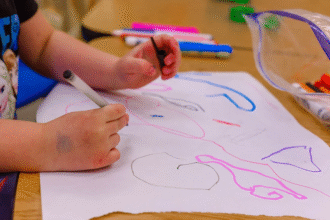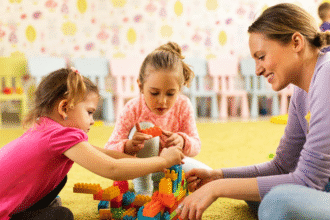Play is often seen as just a fun activity for children. But in reality, play is one of the most powerful tools for learning and growing—especially in the early years. For young children, play is not just about passing time or staying entertained. It’s a vital part of their cognitive development, which means how they learn, think, reason, remember, and solve problems.
Let’s explore how play shapes a child’s mind and why it’s so important in their growth journey.
What is Cognitive Development?
Cognitive development refers to how children think, explore, and figure things out. It’s the process of developing knowledge, problem-solving skills, memory, attention, and decision-making.
In simple words, it’s how a child learns and understands the world around them.
From birth to around age 5, a child’s brain grows at an incredible rate. During this time, they are like little scientists—curious, active, and eager to learn. And their favorite way to learn? Through play.
Why is Play So Important?
Play helps children make sense of their world. When they build blocks, pretend to be superheroes, or even splash in water, they’re not just having fun. They’re learning important skills:
- Solving problems: Figuring out how to stack blocks without them falling.
- Understanding cause and effect: Noticing what happens when they press a button or drop a toy.
- Making decisions: Choosing what game to play or what color to use.
- Building memory: Repeating the same songs or games helps improve memory.
- Learning language: Talking to toys or playing with others improves vocabulary and understanding.
In short, play builds the foundation of thinking, reasoning, and learning.
Types of Play That Support Cognitive Development
There are different kinds of play, and each one helps the brain grow in its own way. Let’s look at some examples:
1. Pretend Play (Imaginative Play)
Children create stories, pretend to be someone else, or act out real-life situations. For example, playing “doctor,” “teacher,” or “shopkeeper.”
Benefits:
- Improves language and communication
- Develops memory
- Builds imagination
- Encourages problem-solving
2. Constructive Play
This involves building or making something—like using blocks, LEGO, or puzzles.
Benefits:
- Enhances spatial awareness
- Teaches planning and sequencing
- Encourages creativity
- Develops hand-eye coordination
3. Physical Play
Running, jumping, dancing, or playing on a playground.
Benefits:
- Boosts brain function by increasing blood flow
- Improves coordination and balance
- Helps in focus and attention
- Releases energy for better learning
4. Games with Rules
Simple board games or group games like “Simon Says” or memory cards.
Benefits:
- Teaches following instructions
- Develops memory
- Encourages turn-taking and fairness
- Improves concentration
5. Exploratory or Sensory Play
Involves touching, smelling, and experimenting—like playing with sand, water, or playdough.
Benefits:
- Sharpens observation and thinking
- Develops curiosity
- Helps understand different textures and materials
- Builds scientific thinking
The Role of Adults in Play
Children can play on their own, but when adults join in or support their play, it becomes even more powerful. Here’s how parents, teachers, and caregivers can help:
- Give time and space for play: Let children play freely every day without pressure.
- Offer a variety of toys and materials: Blocks, art supplies, puzzles, books, and outdoor items.
- Talk during play: Ask questions like “What are you making?” or “Why did you choose that color?” This improves thinking and vocabulary.
- Let children lead: Allow them to guide the play and make choices.
- Encourage exploration: Don’t worry about mess or mistakes—this is how learning happens.
How Play Affects Long-Term Learning
Research shows that children who play more in their early years:
- Do better in school later on
- Have stronger memory and thinking skills
- Are more creative and independent
- Have better social skills and emotional control
In other words, play is not just a break from learning—it is learning.
Schools and parents that focus only on memorizing facts or academic pressure often miss the real secret to smart, happy kids: letting them play.
Real-Life Example
Take 4-year-old Mia. Every day, she builds houses with her blocks and makes up stories with her toy animals. While she’s playing, she’s learning how to balance pieces, tell a story, share toys with her brother, and solve little problems when things fall apart.
To someone watching, it may just look like “playing.” But inside her brain, strong connections are forming that will help her read, write, solve math problems, and even handle emotions as she grows.
FAQs
1. At what age should cognitive development through play start?
Cognitive development through play starts from birth. Even newborns learn by observing and responding to sounds, lights, and movement. As they grow, different types of play help their brain develop at each stage.
2. How much playtime should a young child have daily?
Experts recommend that young children have at least 1–2 hours of free play each day, along with guided play. The more time they spend exploring, the more their brain develops.
3. Can screen time be counted as play?
While some educational apps and videos can support learning, screen time does not replace real, hands-on play. Physical, social, and creative play offers deeper learning and connection.
4. Is structured learning better than play for toddlers?
Not necessarily. While some structure is helpful, toddlers learn best through unstructured, child-led play. Play encourages natural curiosity and allows learning to happen in a stress-free way.
5. What kind of toys are best for cognitive development?
Simple, open-ended toys like blocks, puzzles, pretend kitchen sets, and art supplies are great. Toys that allow kids to think, create, and solve problems are ideal for brain growth.
Final Thoughts
Play is not a waste of time—it is the foundation of all learning. For young children, play feeds their brains, builds their confidence, and helps them make sense of the world. Whether it’s pretending to fly, stacking cups, or exploring the garden, every playful moment is a chance to grow.
So let children play, explore, imagine, and create. You’ll be giving them the best start in life.







